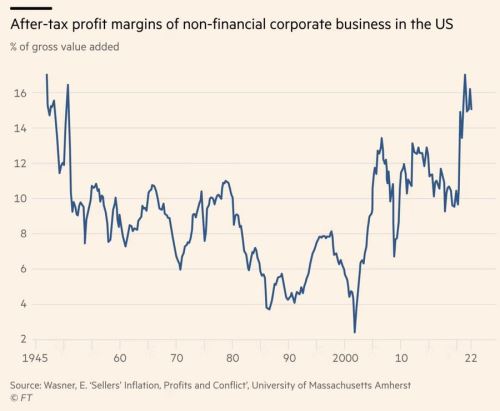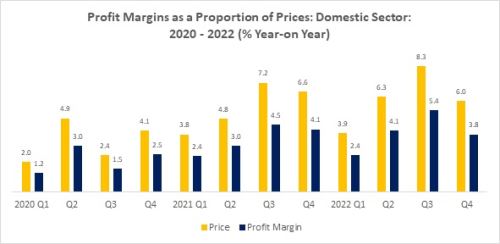By Michael Taft
With inflation rising unexpectedly in February (and at one of the fastest monthly rates since the beginning of the crisis) the question being increasingly asked is: are profits driving inflation? And the evidence increasingly suggests yes.
It’s certainly not wages. The IMF’s historical study of the relationship between wages and prices (79 periods of rising inflation, including Ireland’s experience in the 1970s) found almost no evidence of a wage-price spiral – an alleged phenomenon used to justify rising interest rates and wage ‘moderation’ (i.e. real wage cuts).
‘Wage-price spirals, at least defined as a sustained acceleration of prices and wages, are hard to find in the recent historical record . . .’
This is confirmed by Ireland’s recent experience. In 2022, inflation rose by 7.8 percent. Wages rose by 3.4 percent. No wage price spiral there. If anything, wages have had a disinflationary effect. But what about profits?
- In the US, the Economic Policy Institute found that in the 18-month period between mid-2020 and the end of 2021, profits made up 54 percent of the increase in prices; wages made up only 8 percent.
- In the UK, Unite the Union reported similar findings in the six-month period between October 2021 and March 2022: 59 percent of price rises due to increased profits; 8 percent for wages. The further found companies with increasing profits well above pre-covid levels.
- The Australia Institute argued that the economy was experiencing a ‘price-profit spiral’ with wages contributing only 15 percent to higher prices.
The Financial Times recently looked at this phenomenon in an article headlined, ‘Unchecked corporate pricing power is a factor in US inflation,’ (behind a paywall). They published this graph on the front page. It shows after-tax profit margins in the US rising higher than at any time since 1945.

The ECB has acknowledged this phenomenon. Isabelle Schnabel, a member of the Executive Board of the European Central Bank, stated:
‘. . . on average, profits have recently been a key contributor to total domestic inflation, above their historical contribution . . . To put it more provocatively, many euro area firms, though by no means all, have gained from the recent surge in inflation . . . Poorer households are often hit particularly hard – not only do they suffer from historically high inflation reducing their real incomes, they also do not benefit from higher profits through stock holdings or other types of participation.’
And staying with the ECB, Reuters reported that at a recent retreat in Finland for the ECB’s Governing Board:
‘Data articulated in more than two dozen slides presented to the 26 policymakers showed that company profit margins have been increasing rather than shrinking, as might be expected when input costs rise so sharply . . . An ECB spokesperson declined to comment for this story.’
The Irish Times’ Cantillon notes:
‘Some of the surprise stickiness in inflation was coming from goods inflation. This should have come down with the reopening of supply chains but has remained stubbornly elevated, a trend he (Philip Lane, ECB chief economist) associated with increased corporate profits. Yesterday his boss Christine Lagarde also raised the notion of companies profiteering on the back of inflation . . . ‘
Eurostat’s quarterly sector accounts gives us an aerial view of profits and wages in the non-financial sector. Focusing on our EU peer-group (other high-income countries) over the last two years up to the 3rd quarter in 2022 we find that:
- Profits increased by 25.9 percent
- Employee Compensation increased by 12.8 percent
Profits over this period increased at twice the pace as wages. We find a similar pattern if we go back over three years – starting in the pre-covid period of 2019.
What about Ireland? Irish profits data can be as unreliable as Irish GDP. It incorporates income that is produced in other jurisdictions but booked here to take advantage of our low tax.
The Central Bank has helpfully published data on prices and profits for the domestic sector (excluding multi-nationals).

These measure year-on-year averages. On average, profit margins made up over 60 percent of prices. It should be emphasised that this data relates to the domestically-owned sector – it doesn’t factor in multi-national profits.
However, it is certainly the case that the multi-national sector is more profitable than our domestic sector. And if we use corporate tax revenue as a proxy, we find that it has more than doubled between 2019 and 2022, implying that multi-national profits have more than doubled.
* * *
This price-profit spiral raises a number of questions for policy. If prices are not being driven by wage-fuelled demand, what is the point of ECB’s interest rate increases? The Reuters report went on to quote Paul Donovan, chief economist at UBS Global Wealth Management:
’It’s clear that profit expansion has played a larger role in the European inflation story in the last six months or so. The ECB has failed to justify what it’s doing [increasing interest rates] in the context of a more profit-focused inflation story.’
It is important to note that rising profits are not uniform across the board. We have less insight into the sectoral breakdown of profits than we have wages. The ECB’s Schnabel noted that it is larger, export-oriented firms that are benefitting the most with many smaller firm – in particular, in contact-intensive services (retail. Hospitality, transport, entertainment, etc.) – still struggling.
But there’s a more fundamental question: what is the point of profits? If profits are being direct into increasing dividends and senior executive pay, rather than its social utility (investment), then economies are suffering from a double whammy: profit-fuelled price increases and ECB interest rate increases.
Answering that question, however, calls for a far more radical review of how we run our economies. But the quicker we start that review, the quicker we can begin addressing a myriad of problems, including profit-fuelled inflation.
The above article was originally published here on Notes On The Front. Michael Taft is a researcher for SIPTU (Services, Industrial, Professional and Technical Union) in Ireland.


Recent Comments